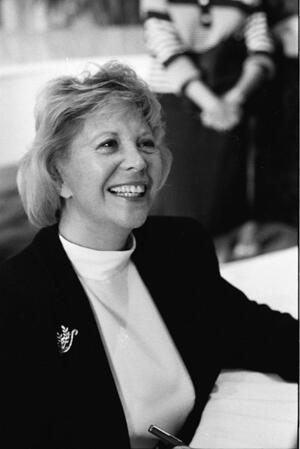Moments in History: Jewish Entertainers of Television
Singer, actress, and talk show host, Dinah Shore (1917 - 1994), Miami Book Fair International, 1990.
Image courtesy of MDCarchives.
Earlier this month we promised more from our new series Moments In History, which commemorates game changing Jewish women in entertainment. Our last entry took a look at women on the silver screen—today we’ll explore stars of the smaller screen.
From Bea Arthur to Joan Rivers, Jewish women have changed the landscape of American television. Jewish women put wit, charm, humor, and smarts at the forefront of their acts—and took over pop culture. Today we'll take a look at four very different Jewish women entertainers.
Shari Lewis brought us Lamb Chops—and became a pioneer in high quality children’s television. (She also introduced a generation to the “song that never ends,” but we’ll forgive her.)
Born in New York City in 1934, Shari Lewis was attracted to music and performance from a young age. In 1952, Lewis appeared on the television show "Talent Scouts," winning first prize with her hand puppet Lamb Chop. Her extensive work in television included her own shows, "Shari-Land" and "The Shari Show," in the late 1950s and early 1960s. By 1959, she had won four Emmy Awards—two as "most outstanding female personality" and two for "television's most outstanding children's show"—and had been described as "all eyes and mouth and charm and talent." These shows, along with her later programs, "Lamb Chop's Play-Along" (1989–1995) and "The Charlie Horse Music Pizza" (1998), were distinguished by their focus on encouraging children to interact with the program. Rather than simply presenting action, Lewis's shows provided opportunities for viewers to make crafts at home, sing along with the characters, and devise their own imaginative play. Always concerned with the quality of children's television programming, Lewis testified in Congressional hearings on the Children's Television Act in 1993. At the hearings before the House Telecommunications Subcommittee, Lewis not only spoke herself, but also brought along the puppet Lamb Chop. The puppet gave an impassioned speech about the need for the government to regulate children's programming. more >>
A quintessential American girl, Dinah Shore mixed song and talk on the airwaves—both radio and television—for over 50 years.
Frances “Fanny” Rose Stein remade herself into Dinah Shore shortly before beginning a career on America’s airwaves with the debut of her variety show on NBC Radio in 1939. She would continue to be a cultural force in the United States for over fifty years. Her radio show made the move to television in 1951, where the variety show continued until 1963, always ending with Shore blowing a big kiss to the camera. She moved to a daytime talk show format for a decade in the ‘70s with "Dinah’s Place" and "Dinah and Friends," where her warmth and intelligent spirit charmed a new generation of viewers, as she mixed her singing with informal chats with entertainment and political figures. more >>
Comedian Gilda Radner brought Jewish comedy, feminine charms and strength in the face of illness into our living rooms.
Gilda Radner's death from ovarian cancer on May 20, 1989 at age 42 cut short a vital life and comedic career. Born in Detroit in 1946, Radner became widely known as a hilarious member the first cast of Saturday Night Live. Radner created numerous memorable characters, like Roseanne Roseannadanna, while on SNL which established her as one of the cast's most popular members. While on SNL, Radner appeared in numerous skits which drew attention to her Jewish identity. Her fake advertisement for "Jewess Jeans," mocked the materialism of young Jewish women, but also presented the "Jewess" as a role model to which women from other ethnic and racial groups should aspire. A skit which focused on the celebration of Hanukkah offered a rare positive enactment of Jewish ritual on 1970s TV. Radner, who had struggled thoughout her career with issues related to eating disorders, battled cancer with fierce humor and continued engagement in the world. In an 1988 appearance on "It's Gary Shandling's Show," she celebrated her own physical and comedic resilience. She also wrote an autobiography during her illness, It's Always Something, describing her career and the support she'd found within the Wellness Community in battling her illness. After a year of remission, Gilda Radner's cancer reemerged, and she died on May 20, 1988. more >>
A rare thing for network television, Roseanne Barr played a working mom in her long running tv show. Controversial? Yes. Entertaining? Indeed. Jewish? You bet.
Although her comedy comes directly from the leftist feminism of the 1970s, Roseanne enjoyed her greatest success from an eponymous sitcom broadcast on ABC-TV beginning in 1988 when the working class had become otherwise invisible to popular culture. In its nine-year run, Roseanne garnered high ratings and the attention of media critics and political writers. Comedy, Roseanne says in her autobiography, “was something that Jews really owned and knew about and did better than almost anyone else. It was the Midrash, it was about connection, and the symbolic murder of the status quo, and the blurring of what is sacred and what is profane ... a place on earth where Jews are not threatening to non-Jews and people in Utah. The comedienne also credits Kabbalah study with improving her comedy, noting, “now I have the entire universe to make fun of. God gave us laughter; everything is funny.” more>>
Read more about Jewish women in television.






